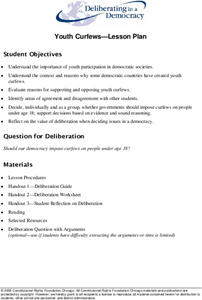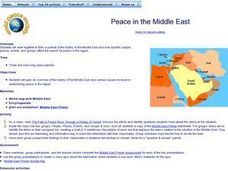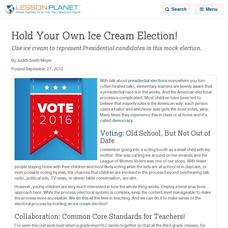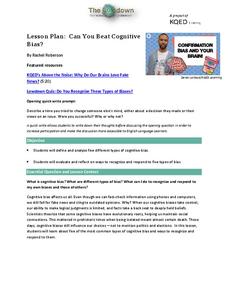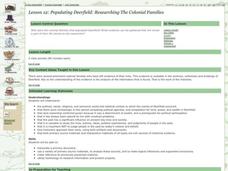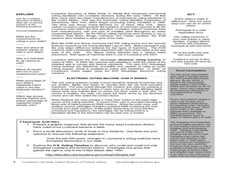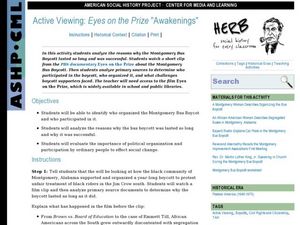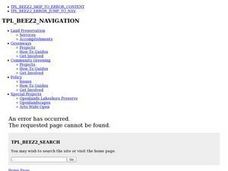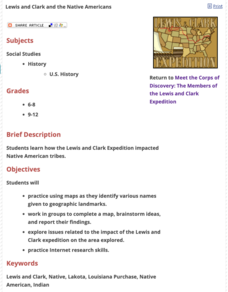Deliberating in a Democracy
Youth Curfews
Don't stay out too late! Scholars analyze the need for youth curfews in a democratic society. They examine primary documents, case studies, and short video clips to form their opinions and take a position on the issue. Holding a class...
Annenberg Foundation
Reconstructing a Nation
Think back to the aftermath of an family dispute. The awkwardness of having to make up, get along, and move forward can be very difficult. The tenth lesson of a 22-part series on American history examines the Reconstruction Era following...
Hildegard Center for the Arts
Mardi Gras Masks
Laissez les bons temps rouler! Create your own festive Mardi Gras masks with a lesson that provides background information on the celebration and instructions about constructing the masks.
Curated OER
Peace in the Middle East
Students study a region. In this history lesson, students discover how different people and events have affected the Middle East in its efforts to be a peaceful area. They work in small groups on an assigned topic and present their...
Curated OER
The Birth of the Ancient Games: The Olympics
This exercise includes a lengthy article on the history of the Olympics as well as a map of Ancient Greece. The last page includes 15 reading comprehension questions about the passage. A fairly thorough look at this topic - geared toward...
Curated OER
Hold Your Own Ice Cream Election!
Use ice cream to represent Presidential candidates in this mock election.
iCivics
Students, Engage!
Discuss as a class some problems that you would like to see changed in your school or community, and then take action! After your young citizens determine the appropriate steps they should take to accomplish their objectives, they will...
Theodore Roosevelt Association
Defining America's Role in the World
As the first American president to win the Nobel Peace Prize, and only one of four presidents to do so in United States history, Theodore Roosevelt's foreign policy achievements and preservation of peace are often overshadowed by his...
NPR
Can You Beat Cognitive Bias?
In a time of fake news, media manipulation, and Internet trolls, a resource equips learners with the tools they need to recognize and combat resources that are designed to appeal to our cognitive biases. Introduce learners to five...
Population Connection
The Peopling of Our Planet
How many people live on the planet, anyway? The first resource in a six-part series covers the topic of the world population. Scholars work in groups to conduct research and make population posters after learning about the global...
Curated OER
Populating Deerfield: A Workday for Researching the Colonial families
Eleventh graders explore who were the colonial families that populated Deerfield and what evidence can be gathered that reveals a part of their life stories to the researcher.
Curated OER
How We Vote
Students fill in a graphic organizer and discuss the struggles in groups about the history of voting in Louisiana. Students also explore a voting timeline to see who could and could not vote before and after 1850.
Curated OER
Civil Rights and Casualties of Wartime
Do your historians fully grasp the consequences of being at war? Help them connect past with present through this group research activity, which has students analysing repercussions suffered by citizens of countries in conflict. Students...
Curated OER
Active Viewing: Eyes on the Prize "Awakenings"
Dive deeper into the Montgomery Bus Boycott with this multi-stage lesson, centered on the essential question: Why did the boycott last so long? Historians investigate the Jim Crow south through a video clip (not included), then analyze...
Curated OER
Teaching with Poster Art: World War I Posters
Students interpret historical evidence presented in primary resources. For this World War I lesson, students examine World War I posters. Students investigate the use of propaganda strategies in the posters and discuss the visual metaphors.
Curated OER
Women and Korean Literature
Students read a text about women in Korean and their role in Korean literature. In this Korean literature lesson, students read a text by Helen Koh to learn about women writers in Korea.
Curated OER
We the People: A Study in American Voter Turnout: US Government
Students examine and compare voter turnout in US Elections. They write a letter to a favorite candidate or representative suggesting ways to increase voter turnout.
Curated OER
Jump if you feel like it
Students incorporate historical references into the modern circle dances.
Curated OER
Easter Egg Surprise
Young readers describe objects by using describing words. After reviewing the five senses, they use their senses to gain information about an object. Then as homework, they write three descriptive words about a mystery object and place...
Curated OER
Rosie the Riveeter and Mary the Munitions Worker
Tenth graders study the role that places like the Joliet Arsenal played in how women were view in American society during and after World War II. They interview a person from the World War II era about the job they performed and how...
Curated OER
Lewis and Clark and the Native Americans
Students practice using maps and identifying landmarks on the Lewis and Clark expedition. They research Lewis and Clark's relationship with the Native Americans and report their findings to the class. They identify the impact of the...
Curated OER
Preparing for the Possibility of Terrorists
Students research the terrorist threat to the United States. They examine types of possible attacks and the best way to be prepared for each. Students disseminate information to the community. They publicize the school disaster plan.
Curated OER
Protecting your home from carbon monoxide
Pupils create and distribute flyers, mailings, posters in public areas to help make people aware of how to protect yourself from carbon monoxide. Students research what carbon monoxide is and what can be done to protect those in the...
Curated OER
Rural Communities Make a Difference
High schoolers research what analysts say influenced Ohio voters in a Presidential election and discuss what that meant in the election, especially in Ohio. Students use provide Internet sources for research.
